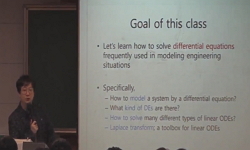The present study is experiment about the frequency response in DC motor around the corner frequency. Assuming that DC motor keeps 1st system characteristics. The time constant is a reciprocal number of the corner frequency in the 1st system. Using DC...
http://chineseinput.net/에서 pinyin(병음)방식으로 중국어를 변환할 수 있습니다.
변환된 중국어를 복사하여 사용하시면 됩니다.
- 中文 을 입력하시려면 zhongwen을 입력하시고 space를누르시면됩니다.
- 北京 을 입력하시려면 beijing을 입력하시고 space를 누르시면 됩니다.
https://www.riss.kr/link?id=A106297151
- 저자
- 발행기관
- 학술지명
- 권호사항
-
발행연도
2015
-
작성언어
-
-
주제어
DC모터 ; 절점주파수 ; 1차 시스템 ; 시정수 ; 모터속도 ; PWM 드라이버 ; 엔코더 ; 보간법 ; DC Motor ; Corner Frequency ; 1st System ; Time Constant ; Motor Velociy ; PWM Driver ; Encoder ; Interpolation
-
KDC
581
-
자료형태
학술저널
-
수록면
31-36(6쪽)
- 제공처
-
0
상세조회 -
0
다운로드
부가정보
다국어 초록 (Multilingual Abstract)
The present study is experiment about the frequency response in DC motor around the corner frequency. Assuming that DC motor keeps 1st system characteristics. The time constant is a reciprocal number of the corner frequency in the 1st system. Using DC motor with encoder circulating the market, I make experimental set to measure the DC motor speed. By applying the unit step voltage to DC motor, the velocity variation of the DC motor is measured through encoder sensor. I quantify the time constant using interpolation in velocity variation data and calculate the corner frequency. To compare the experimental velocity and the theoretical velocity, the eight frequencies(0.2Hz, 0.5Hz, 1.0Hz, 2.5Hz, 3.5Hz, 5.5Hz, 8.5Hz, 13Hz) are selected. PWM control inputs of the above eight frequency apply to DC motor driver and acquire the motor velocity through encoder signal respectively. To evaluate the difference of the motor velocity and the 1st system output, I use linear regression. As a result the correlation coefficient is 0.95572.
목차 (Table of Contents)
- ABSTRACT Ⅰ. 서론 Ⅱ. 단위계단응답 시정수와 절점주파수 Ⅲ. 재료 및 실험방법 Ⅳ. 실험 결과 Ⅴ. 고찰 및 결론 참고문헌
- ABSTRACT Ⅰ. 서론 Ⅱ. 단위계단응답 시정수와 절점주파수 Ⅲ. 재료 및 실험방법 Ⅳ. 실험 결과 Ⅴ. 고찰 및 결론 참고문헌
동일학술지(권/호) 다른 논문
-
- 산업기술교육훈련학회
- 김황열
- 2015
-
다구치 방법을 이용한 냉각 필터 사출성형 공정의 최적화
- 산업기술교육훈련학회
- 박태원
- 2015
-
- 산업기술교육훈련학회
- 손일복
- 2015
-
- 산업기술교육훈련학회
- 진용주
- 2015




 스콜라
스콜라






